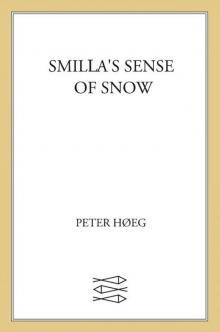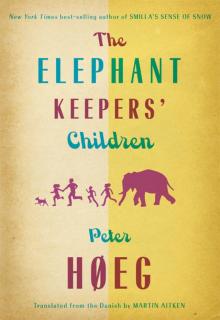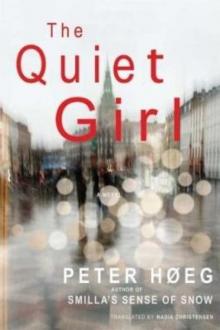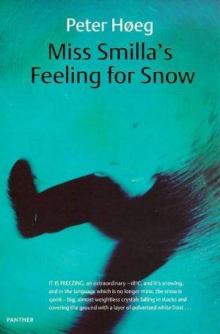- Home
- Peter Høeg
Smilla's Sense of Snow aka Miss Smilla's Feeling for Snow Page 4
Smilla's Sense of Snow aka Miss Smilla's Feeling for Snow Read online
Page 4
Later she once tried to explain to me why one month there are 3,000 narwhals gathered in a single fjord seething with life. The next month the ice traps them and they freeze to death. Why there are so many auks in May and June that they color the cliffs black. The next month half a million birds are dead of starvation. In her own way she wanted to point out that behind the life of the Arctic animals there has always been this extreme fluctuation in population. And that in these fluctuations, the number we take means less than nothing.
I understood her, understood every word. Then and later on. But that didn't change a thing. The year after-the year before she disappeared-I began to feel nauseated when I went fishing. I was then about six years old. Not old enough to speculate about the reason. But old enough to understand that it was a feeling of alienation toward nature. That some part of it was no longer accessible to me in the natural way that it had been before. Perhaps I had even then begun to want to understand the ice. To want to understand is an attempt to recapture something we have lost.
"Professor Loyen…"
My father pronounces the name with the interest and armed respect with which one brontosaurus has always regarded another. "A very talented man."
The white palm of his hand moves over his cheek and chin. It's a carefully studied gesture which makes a sound like the rasp of a coarse file on a piece of driftwood. "The Institute for Arctic Medicine-he created it."
"What's his interest in forensic medicine? He's let himself be appointed pathologist for Greenland."
"He was originally a forensic pathologist. But he accepts anything that brings merit. He must think it's a good career move."
"What drives him?"
There is a pause. My father has moved through most of his life with his head under his arm. In old age he has become acutely interested in people's motives.
"In my generation there are three kinds of doctors. There are those who get stuck as assistant hospital physicians or end up in private practice. There are many fine people among them. Then there are those who finish writing their dissertation, which is-as you know, Smilla-the arbitrary and ludicrous and inadequate prerequisite for upward mobility in the system. They end up as chiefs of staff. They are minor monarchs in the local society of medicine. Then there are the third kind. Those of us who rose up and have come out on top."
This is said without any hint of self-irony. You could get my father to state, in all seriousness, that one of his problems is that he isn't half as pleased with himself as he has every reason to be.
"To take those last swimming strokes demands a particular strength. A strong desire or ambition. For money. Or power. Or perhaps insight. In the history of medicine this struggle has always been symbolized by fire. The eternal flame of the alchemist beneath the retort."
He gazes straight ahead, as if he had a syringe in his hand, as if the needle were about to reach its goal. "Loyen," he says, "from the time of his school days, has wanted only one thing. Next to that, everything else is trivial. He has wanted to be recognized as the best in his field. Not the best in Denmark, among all the peasants. The best in the universe. His professional ambition is the perpetual flame inside him. And it's not a gas jet. It's a Midsummer bonfire."
I don't know how my mother and father met. I do know that he came to Greenland because this hospitable land has always been the site of scientific experiments. He was in the process of developing a new technique for the treatment of trigeminal neuralgia, an inflammation of the facial sensory nerve. Previously, this condition was assuaged by killing the nerve with injections of alcohol, which led to partial facial paralysis and loss of sensation on one side of the musculature of the mouth, the so-called drooping lip. This can afflict even the best and richest of families, which is why my father had become interested in it. There were many incidences of that illness in North Greenland. He had come to treat them with his new technique-a partial heat-denaturing of the affected nerve.
There are photographs of him. Wearing his Kastinger boots and his down clothing, with ice ax and glacier goggles, in front of the house they put at his disposal on the American base. With his hands on the shoulders of the two short, dark men who are to interpret for him.
For him, North Greenland was truly the outermost Thule. Not for a minute did he imagine that he would stay more than the one required month in a windblown ice desert, where there wasn't even a golf course.
You might have some clue to the white-hot energy between him and my mother if you consider the fact that he stayed there four years. He tried to get her to move onto the base, but she refused. For my mother, just like everyone born in North Greenland, any suggestion of being cooped up was intolerable. Instead, he followed her out to one of the barracks made of plywood and corrugated tin that were put up when the Americans drove the Inuits out of the area where the base was built. Even today I still ask myself how he managed it. The answer, of course, is that as long as she was alive, he would have left his golf bag and clubs behind at a moment's notice to follow her, even right into the searing center of black hell.
"They had a child," people say. In this case that wouldn't be correct. I would say that my mother had my little brother and me. Outside of this scenario was my father, present without being able to take any real part, dangerous as a polar bear, imprisoned in a land that he hated by a love that he did not understand and that held him captive, over which he seemed to have not even the slightest influence. The man with the syringes and the steady hands, the golf player Moritz Jaspersen.
When I was three years old, he left. Or rather; his own character drove him away. Deep within every blind, absolute love grows a hatred toward the beloved, who now holds the only existing key to happiness. I was, as I said, only three years old, but I remember how he left. He left in a state of seething, pent-up, livid, profane rage. As a form of energy this was surpassed only by the longing that flung him back again. He was stuck to my mother with a rubber band that was invisible to the rest of the world but which had the effect and physical reality of a drive belt.
He didn't have much to do with us children when he was there. From my first six years I remember only traces of him. The smell of the Latakia tobacco he smoked. The autoclave in which he sterilized his instruments. The interest he aroused whenever he would occasionally put on his cleats, take up a stance, and shoot a bucket of balls across the new ice. And the mood he brought with him, which was the sum of the feelings he had for my mother. The same kind of soothing warmth that you might expect to find in a nuclear reactor.
What was my mother's role in this? I don't know, and I will never find out. Those who understand such things say that the two spouses must always assist each other if a relationship is truly to founder and turn to flotsam. That's possible: Like everybody else, from the age of seven I have painted my childhood with lots of false colors, and some of this may have rubbed off on my mother as well. But in any case, she was the one who stayed where she was, and set out her nets and braided my hair. She was there, a huge presence, while Moritz with his golf clubs and beard stubble and syringes oscillated between the two extremes of his love: either a total merging or putting the entire North Atlantic between him and his beloved.
No one who falls into the water in Greenland comes up again. The sea is less than 39°F, and at that temperature all the processes of decomposition stop. That's why fermentation of the stomach contents does not occur here; in Denmark, however, it gives suicides renewed buoyancy and brings them to the surface, to wash up on shore.
But they found the remains of her kayak, which led them to conclude that it must have been a walrus. Walruses are unpredictable. They can be hypersensitive and shy. But if they come a little farther south, and if it's autumn, when there are few fish, they can be transformed into some of the swiftest and most meticulous killers in the great ocean. With their two tusks they can stave in the side of a ship made of ferrocement. I once saw hunters holding a cod up to a walrus that they had captured alive. The walrus puckered
up his lips as for a kiss and then sucked the meat right off the bones of the fish.
"It would be nice if you came out here for Christmas, Smilla."
"Christmas doesn't mean anything to me."
"Are you planning to let your father sit here all alone?" This is one of the annoying tendencies that Moritz has developed with age-this mixture of perfidy and sentimentality.
"Couldn't you try the Old Men's Home?"
I have stood up, and now he comes over to me. "You're damned heartless, Smilla. And that's why you've never been able to hold on to a man."
He's as close to tears as he can get. "Father," I say, "write me a prescription."
He switches immediately, fast as lightning, from complaint to concern, just as he did with my mother.
"Are you ill, Smilla?"
"Very. But with this piece of paper you can save my life and keep your Hippocratic oath. It has to be five figures." He winces; it's a matter of his life's blood. We're talking about his vital organs: his wallet and his checkbook. I put on my fur. Benja does not come out to say goodbye. At the door he hands me the check. He knows that this pipeline is his only connection to my life. Even this he is afraid of losing.
"Don't you want Fernando to drive you home?" Then something dawns on him. "Smilla," he shouts, "you're not going away, are you?"
There is a snow-covered lawn between us. It might just as well have been the ice cap.
"There's something weighing on my conscience," I say. "It'll take money to do something about it."
"In that case," he says, half to himself, "I'm afraid that check isn't nearly enough."
In this way he has the last word. You can't win every time.
7
Maybe it's a coincidence, maybe it's not a coincidence, that he arrives when the workers are at lunch, so that the roof is deserted.
There is bright sunshine with a hint of warmth, blue sky, white seagulls, a view of the shipyard at Limhamn in Sweden across the Sound, and not a trace of the snow that was the reason for us standing here: me and Mr. Ravn, the investigator for the district attorney.
He's short, no taller than I am, but he's wearing a very large gray coat with so much padding in the shoulders that he looks like a ten-year-old boy acting in a musical about Prohibition. His face is dark and burned-out like lava, and so gaunt that his skin is stretched across his skull like a mummy. But his eyes are alert and observant. "I thought I'd just stop by," he says.
"You're much too kind. Do you always stop by regarding complaints?"
"Only rarely. Normally the case goes to the local board. Let's just say it's because of the nature of this case and because of your thought-provoking letter of complaint."
I say nothing. I let the silence work on the investigator a little. It has no visible effect. His sand-colored eyes rest on me without flinching and without embarrassment. He will stand here as long as it takes. This alone makes him an unusual man.
"I spoke to Professor Loyen. He told me that you came in to see him. That you thought the boy was afraid of heights."
His position in the world makes it impossible for me to have any real trust in him. But I feel an urge to reveal part of what is bothering me.
"There were the tracks in the snow."
Very few people know how to listen. Their haste pulls them out of the conversation, or they try internally to improve the situation, or they're preparing what their entrance will be when you shut up and it's their turn to step on stage.
It's different with the man standing in front of me. When I talk, he listens without distraction to what I say, and only to what I say.
"I read the report and looked at the pictures…"
"There was something else, something more."
Now we're on our way into something that has to be said but can't be explained.
"They were acceleration tracks. When you take off from snow or ice, a pronation occurs in the ankle joint. Like when you walk barefoot in the sand."
I try to demonstrate the slight outward rotation with my wrist.
"If the movement is too fast, not firm enough, there will be a little slip backward."
"As with every child who is playing…"
"When you're used to playing in snow, you don't leave that kind of track because that movement is not efficient, like faulty distribution of your weight going uphill on cross-country skis."
Even I can hear how unconvincing it must sound. I wait for a scornful remark. But it doesn't come.
He looks out across the roof. He has no nervous tics, no habit of touching his hat or lighting his pipe or shifting his weight from one foot to another. He has no notebook that he pulls out. He is simply a very small man who listens and thinks things over carefully.
"Interesting," he says at last. "But also rather… insubstantial. It would be difficult to present this to a layman. Difficult to base anything on it."
He was right. Reading snow is like listening to music. To describe what you've read is like explaining music in writing.
When it happens for the first time, it's like discovering that you're awake while everyone else is sleeping. Equal parts loneliness and omnipotence. We're on our way from Qinnissut to the mouth of Inglefield Bay. It's winter, the wind is blowing, and it's terrifyingly cold. When the women need to pee, they have to light a Primus stove under a blanket in order to pull down their pants without getting frostbite instantly.
For some time we've noticed that fog is on the way, but when it comes, it comes suddenly, like a collective blindness. Even the dogs huddle together. But for me there really isn't any fog. There is a wild, bright feeling of elation, because I know with absolute certainty which way we should go.
My mother listens to me, and the others listen to her. I am placed on the front sled and I can remember feeling that we were driving along a string of silver, stretched between me and the house in Qaanaaq. The instant before the corner appears out of the night, I know that it's there.
Maybe it wasn't the first time. But that's how I remember it. Maybe it's wrong when we remember breakthroughs to our own being as something that occurs in discrete, extraordinary moments. Maybe falling in love, the piercing knowledge that we ourselves will someday die, and the love of snow are in reality not some sudden events; maybe they are always present. Maybe they never completely vanish, either.
There is another image of fog, possibly from that same summer. I have never sailed much. I'm not familiar with the landscape underwater. It's unclear why they've taken me along. But I always know where we are in relation to landmarks on shore.
From then on they start taking me along almost every time.
At the American military Coldwater Laboratory on Pylot Island they had people on staff to research the "sense of orientation" phenomenon. There I saw thick books and long lists of articles about the fact that directionally constant winds blow along the ground, giving ice crystals a particular angle, so that even in bad visibility you should be able to determine the points of the compass. That another, barely noticeable breeze a little higher up causes a definite cooling of one side of the face in fog. That the subconscious subliminally registers even the light not normally noticed. There is a theory that in the Arctic regions the human brain is able to register the powerful electromagnetic turbulence from the magnetic North Pole in the vicinity of Bucha Felix.
Verbal lectures on the experience of music.
My only spiritual brother is Newton. I was moved when, at the university, they introduced us to the passage in Principia Mathematica, Book One, where he tips a bucket full of water and uses the tilted surface of the water to argue that there is Absolute Space inside and surrounding the rotating earth and the turning sun and the tumbling stars, which makes it impossible to find any constant starting point or initial system or fixed point in life. Absolute Space-that which stands still, that which we can cling to.
I could have kissed Newton. Later I despaired over Ernst Mach's criticism of the bucket experiment, the criticism which forme
d the basis for Einstein's work. I was younger then and more easily moved. Today I know that all we did was prove that Newton's arguments were inadequate. Every theoretical explanation is a reduction of intuition. No one has budged my or Newton's certainty about Absolute Space. No one is going to find his way home to Qaanaaq with his nose stuck in Einstein's writings.
"So what do you think happened?"
There is nothing as disarming as a sympathetic response.
"I don't know," I say. That's very close to being the truth.
"What do you want us to do?"
My objections suddenly seem so transparent here in the daylight, where the snow has melted, and across Knippels Bridge life is going on, and a courteous person is speaking to me. I have no reply.
"I'll review the case again," he says, "from beginning to end, and look at it in light of what you have told me." We climb down, and it's also a descent into the depression waiting for me down there.
"I'm parked at the corner," he says. And then he makes his big mistake.
"I would suggest that while we review the case, you withdraw your complaint. So that we can work undisturbed. And for the same reason, if the newspapers should contact you, I think you ought to refuse to comment on the case. And don't mention what you've told me, either. Refer them to the police; tell them we're still working on the case."
I can feel myself blushing. But it's not from embarrassment. It's from anger.
I'm not perfect. I think more highly of snow and ice than love. It's easier for me to be interested in mathematics than to have affection for my fellow human beings. But I am anchored to something in life that is constant. You can call it a sense of orientation; you can call it woman's intuition; you can call it whatever you like. I'm standing on a foundation and have no farther to fall. It could be that I haven't managed to organize my life very well. But I always have a grip-with at least one finger at a time-on Absolute Space.

 The Woman and the Ape
The Woman and the Ape Smilla's Sense of Snow
Smilla's Sense of Snow Borderliners
Borderliners The Susan Effect
The Susan Effect The History of Danish Dreams
The History of Danish Dreams The Elephant Keepers' Children
The Elephant Keepers' Children The Quiet Girl - Peter Hoeg
The Quiet Girl - Peter Hoeg Smilla's Sense of Snow aka Miss Smilla's Feeling for Snow
Smilla's Sense of Snow aka Miss Smilla's Feeling for Snow